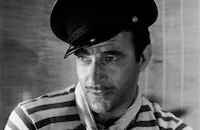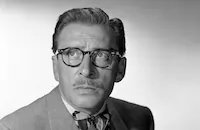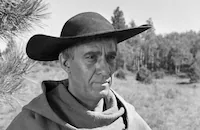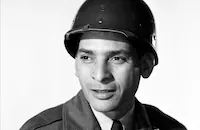Crisis

Brief Synopsis
Cast & Crew
Richard Brooks
Cary Grant
Jose Ferrer
Paula Raymond
Signe Hasso
Ramon Novarro
Film Details
Technical Specs

Synopsis
Brain surgeon Dr. Eugene Ferguson and his wife Helen are on vacation in a Latin American country when a bomb, planted by revolutionaries against President Raoul Farrago, explodes at a jai alai game. Fearing full-scale war, they soon decide to return to their ship, but are arrested on the way by Colonel Adragon. He places them on a train, where they are treated like prisoners, but when they reach the palace of the President, his wife, Isabel Farrago, greets them warmly. She soon reveals that Farrago suffers from a brain tumor and needs Eugene's expertise. At the palace, they are kept under guard again, which frightens Helen and makes Eugene resentful. Therefore, he is cold when he meets Farrago, who speaks at length about the childishness of his people and their need for strong leadership. Eugene agrees to operate in a few days, in return for their passports, freedom to move around and a hefty fee, all of which he is granted. That night the couple dines with American oil businessman Sam Proctor, who warns them to leave immediately because saving Farrago's life will make them very unpopular with the people. Adragon follows them to a nightclub, where he beats a waitress and threatens to arrest many of the citizens. Eugene, however, forces him to leave, endearing himself to the patrons. Over the next few days, Eugene witnesses several examples of Farrago's tyranny over his army, church and people. Eugene speaks his mind to the ailing president, who needs his help and so cannot complain. One day Helen goes to church with Isabel and is mobbed afterward, causing a fearful Eugene to send her back to America on a train. While Eugene tries to train his surgical helpers to perform brain surgery and Farrago plans an outside war that will stop his own civil war, revolutionary Roland Gonzales kidnaps Helen and sends a messenger with a letter to Eugene stating that he will kill Helen if the doctor heals Farrago. The messenger, however, is a traitor who gives the letter to Isabel, so when the day of the operation arrives, Eugene works for five hours and saves Farrago. Afterward he is granted his freedom and stops at a nightclub with Sam, who realizes something is wrong and brings Eugene to Gonzales. Gonzales informs him that he has Helen, and Eugene flees back to Farrago just as the revolutionaries attack the palace. As shots fly through the window at Farrago, he again tells Eugene how he must save his people from themselves, and then dies of a brain hemorrhage. Gonzales bursts in and, believing Eugene has killed the president, sets Helen free. In the streets, Gonzales speaks the same words the president had uttered about taming the unruly populace, and then is downed by a passing bullet. He calls for Eugene to save him and Eugene stares at him, uncertain of how to respond.

Director

Richard Brooks
Cast

Cary Grant

Jose Ferrer

Paula Raymond

Signe Hasso

Ramon Novarro

Gilbert Roland

Leon Ames

Antonio Moreno
Teresa Celli
Mario Siletti
Vicente Gomez

Martin Garralaga
Pedro De Cordoba

Soledad Jimenez
Joe Dominguez
Robert Tafur

Maurice Jara
Rodolfo Hoyos Jr.
Rita Conde
Roque Ybarra
Felipe Turich
Captain Garcia
George Lewis
Carlo Tricoli
Kenneth Garcia
Harry Vejar
Trina Varela

Bridget Carr
Audrey Betz
Bob Lugo
Myron Marks
Al Haskell
Rafael Gomez
Zacharias Yaconelli
Alex Montoya
Margaret Martin
Juan Duval
Fernando Del Valle
Andy Carrillo
Robert Polo
Jerry Riggio
Melba Meredith
Lillian Israel
Carlotta Monti
Connie Montoya
George Novarro
Orlando Beltram
Eddie Gomez
Pepe Hern
David Cota
George Brady
Joaquin Garay
Neyle Morrow
Larry Crane
Felipe Turich
Danilo Valente
Sam Herrera

Merrill Mccormick
Carlos Figueroa
Robert Cabal
Manuel Paris
Carlos Barbé
Amapola Del Vando
Phyllis Hill
Charles Rivero
Mickey Contreras
Carlos Conde
Crew
W. P. Allen
Preston Ames
Richard Brooks
Jack Dawn
George Elder
Norwood Fenton
Arthur Freed
Cedric Gibbons
A. Arnold Gillespie
Vicente Gomez
Sydney Guilaroff
Hugh Hunt
Ray June
Robert J. Kern
Howard Koch
Lew Lacava
Don Mcdougall
Frank Myers
Warren Newcombe
Jack Nickolaus Jr.
Harry Parkins
Mervyn Price
Dr. Tracy Putnam
Lillian Rader
Ruby Rosenberg
Miklos Rozsa
Douglas Shearer
Edwin B. Willis

Photo Collections
Film Details
Technical Specs

Articles
Crisis
Crisis marked the directorial debut of Richard Brooks who had already established himself as a first class screenwriter at MGM. Producer Arthur Freed had promised Brooks he would get a chance to direct after completing Any Number Can Play (1949) and let him pick his own project. Brooks, acting as writer and director, chose "The Doubters," a short story by George Tabori about a South American dictatorship that bore strong similarities to Juan and Eva Peron's rise to power. Brooks then traveled to Bogota, Columbia for preliminary research and after visiting several other Central American locations mapped out his scenario, which first focused on a widower and his ten-year-old daughter who becomes a kidnap victim. This plot device was later altered after Brooks was unable to cast Spencer Tracy in the lead role. In a chance meeting with Cary Grant at the Santa Anita racetrack, Brooks learned the actor was interested in the role but confessed it would be his first film as a director. Grant replied, "If you can write them I guess you can direct them."
Even with Cary Grant's full support, Brooks had a baptism by fire on the set of Crisis. As a first time director with strong opinions of his own, he was resented by many of the older, more seasoned veterans among his crew. Brooks later revealed in The World of Entertainment by Hugh Fordin that "There were endless battles and a barrage of outrages between myself and Cedric Gibbons. I had tremendous respect for his talent, but I guess politically and socially we were the exact opposites. He knew so much and I knew so little that all my demands or ideas were argued against....I would say to Ray June, the cameraman, 'I don't want this kind of lens.' June would say, 'What do you know about lenses? Can you tell me from here to here what distance we are now or what lens I'm using?' I would say, 'No, I can't.' And he'd say, 'Well, before you talk to me you find out.' But that forced me to learn about lenses.'
The incident that created the biggest hullabaloo was a freak accident that shut down the picture momentarily. A huge camera crane, weighing about a ton and a half, accidentally rolled over the director's foot during a scene with Cary Grant and Jose Ferrer. Brooks was reluctant to seek medical attention for fear of being replaced on the film but Grant assured him, 'If they get a new director, they're going to have to get a new actor. Now, get to the hospital.' Luckily, Brooks didn't suffer any broken bones, just a badly bloodied foot.
Grant's generosity extended to others on the picture as well. For three of the Spanish-speaking roles in the film, Grant successfully campaigned for the casting of Ramon Navarro (He played the title role in the 1925 version of Ben-Hur), Gilbert Roland, and Antonio Moreno, all former silent stars. He even consoled Nancy Davis, the future Mrs. Ronald Reagan, when she lost the role of the surgeon's wife to Paula Raymond. More importantly, Grant rewarded Brooks' hard work by his own thorough preparation for the role: he studied operating room procedures with a surgeon at night, observed numerous hospital surgeries, and interviewed nurses, doctors, and orderlies. The result was one of Grant's most authentic portrayals but the MGM publicity department, anxious that the serious subject matter of Crisis might scare away Grant's adoring fans, promoted the film with the misleading tagline, "Carefree Cary on a vacation!" As a result, the film had a hard time reaching its intended audience but it did launch Richard Brooks as a director and proved Grant was a fine dramatic actor.
Director: Richard Brooks
Producer: Arthur Freed Screenplay: Richard Brooks, George Tabori (story)
Art Direction: E. Preston Ames, Cedric Gibbons
Cinematography: Ray June
Film Editing: Robert Kern
Original Music: Mikl-s R-zsa
Principal Cast: Cary Grant (Dr. Eugene Norland Ferguson), Jos?errer (Raoul Farrago), Paula Raymond (Helen Ferguson), Signe Hasso (Senora Isabel Farrago), Ramon Novarro (Colonel Adragon), Gilbert Roland (Gonzales), Leon Ames (Sam Proctor).
BW-96m. Closed captioning.
by Jeff Stafford

Crisis
Quotes
Well, doctor, did the operation go well?- Raoul Farrago
Fine. You just died.- Dr. Eugene Norland Ferguson
Same old cry through the ages--save me, doctor. Save me, anybody.- Dr. Eugene Norland Ferguson
Trivia
Notes
The working title of this film was Ferguson. An August 1949 Hollywood Reporter news item announced that location filming was planned in South America, but no filming took place there. A January 1950 Daily Variety news item indicates that Cary Grant was coached by Dr. Tracy Putnam for the brain surgery sequences. According to a memo in the file on the film in the MPAA/PCA Collection at the AMPAS Library, a version of the script submitted to the PCA for review in October 1949 was deemed "unacceptable" under the provisions of the Production Code. The Breen Office stated that the primary reason for the rejection was the lie told by "Dr. Eugene Ferguson" about the death of "Raoul Farrago" and the presentation of Ferguson's intentional murder of Farrago as having been justifiable. As a solution to problem, the Breen Office suggested that the script be amended to have Ferugson "make a last-minute, desperate effort to force information concerning his wife from the tyrant at the threat of gun point." Regional censorship reports indicate that the film was banned in Colombia for political reasons, and in Peru and Mexico because it was deemed "derogatory" to Latin America.
The film marked the directorial debut of screenwriter Richard Brooks, who went on to direct, write and produce several highly-acclaimed films, including The Blackboard Jungle (1955) and In Cold Blood (1967). Crisis also marked the first major role in twenty-three years for silent film star Antonio Moreno, who last appeared in an M-G-M film in 1926. Gilbert Roland and Ramon Novarro were also silent screen stars. Phyllis Hill, who at the time of the film's production was the real-life wife of José Ferrer, made her screen debut in the film.
Modern sources provide the following additional information about the production: Brooks visited several South American countries in 1949 to research the film. Brooks's plans to shoot the film on location in Colombia were opposed by producer Arthur Freed, who persuaded Brooks to keep his first film as director on the studio lot. Spencer Tracy was initially considered for the part played by Grant. Actress Sylvia Sidney tested for the role played by Signe Hasso, and actress Nancy Davis was also tested for a role. Grant was paid $200,000 for his work. Brooks, fearing that he would be replaced as director on the film at the slightest provocation, initially refused medical attention when a heavy camera crane ran over his foot during production. Brooks encountered many difficulties on the set as a first-time director, often finding himself engaged in bitter arguments with some of the more experienced members of the production crew, including cameraman Ray June and art director Cedric Gibbons. In a modern interview, Brooks claimed that the crane incident was not an accident. The film was completed at a cost of just over $1,600,000, and lost $713,000 in its first run. Robert Taylor and Paula Raymond starred in a April 21, 1952 Lux Radio Theatre adaptation of the story.

Miscellaneous Notes
Released in United States April 1981
Released in United States July 7, 1950
Released in United States Winter January 1, 1950
Broadcast over TNT (colorized version) September 1, 1989.
Released in United States Winter January 1, 1950
Released in United States April 1981 (Shown at FILMEX: Los Angeles International Film Exposition (Latin Goes Hollywood) April 2-23, 1981.)
Released in United States July 7, 1950














